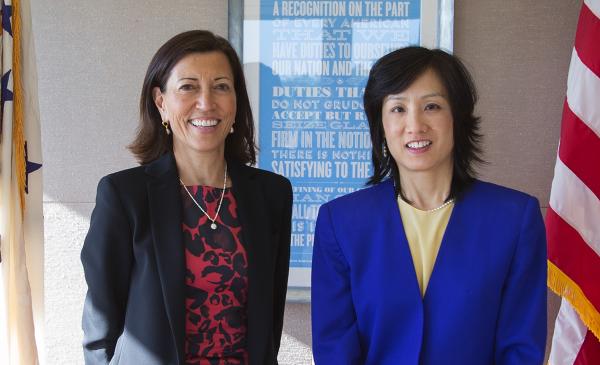During the WIPO 2014 General Assembly’s discussions of patents and health in the context of the work of the Standing Committee on the Law of Patent (SCP), the Obama Administration embraced an aggressive position against WIPO technical assistance on the use of patent limitations and exceptions.

|
| Ambassador Pamela Hamamoto and Michelle Lee led the effort to block work on exceptions to drug patents for poor people at WIPO. |
The hard line position at WIPO reflects the anti-poor views of Michelle Lee, the soon to be confirmed head of the USPTO, Shira Perlmutter, the Chief Policy Officer and Director for International Affairs at USPTO, Ambassador Pamela Hamamoto, Permanent Representative to the United Nations in Geneva, Ambassador Michael Froman, the head of USTR, Karin Ferriter, the hardliner representing USTR, and Carrie LaCrosse, a Foreign Affairs Officer, Intellectual Property and Innovation Policy, US Department of State.
The United States expressed that “it did not support continuing work in the SCP that was heavily tilted towards the erosion of patent rights.” In particular, the US objected to a work program focused on exceptions and limitations of patent rights “without also having a tangible work program on substantive patent law.”
 |
| Carrie LaCrosse represented the Department of State at the WIPO GA. She is a graduate of the JFK School of Government at Harvard, and has been following negotiations on drug patents since the Bush Administration. |

|
| Karin Ferriter is considered the most unsympathetic USTR official toward poor people since Sean Murphy. She was first sent to Geneva by Arti Rai. |
For the United States, work of the SCP is duplicative of the Development Agenda’s Committee on Development and IP (CDIP) work and an inefficient use of the SCP’s time. At its most strident, the United States
“expressed its disbelief that flexibilities were the exclusive solution to the public health problems faced by developing countries and LDCs. The Delegation supported a balanced approach to finding solutions to the public health challenges in those countries, which were not limited to flexibilities, such as compulsory licensing and exhaustion of patent rights, but also included the benefits of strong IPR regimes, and the effect of non-IPR barriers to delivering healthcare. The Delegation further stated that it did not support developing within WIPO a technical assistance module on TRIPS flexibilities. In its view, the WTO was the appropriate body with the mandate to determine compliance with the TRIPS Agreement. Therefore, the Delegation was mindful that such pronunciations on the TRIPS Agreement would be outside the scope of WIPO’s mandate.”
Source WIPO Draft Report, Forty-Sixth (25th Extraordinary) Session .
Regarding the Patent Prosecution Highway (PPH), the US underscored its view that “far from being a program that infringed on national sovereignty or that required offices to rubber stamp the patentability decisions of other offices, the PPH helped participating national offices to make their own speedy and correct patentability decisions according to national laws.”
Please see below for the full WIPO summary of the US intervention.
179. The Delegation of the United States of America supported a balanced work program for the SCP. The Delegation expressed its belief that the non-exhaustive list of issues attached to the report on the international patent system provided a good basis for such discussions as it was of interest for all levels of development. The Delegation of the United States of America supported further studies of those issues in a balanced manner to reach consensus that would take into account the range of interests represented by all Member States. The Delegation further stated that it did not support continuing work in the SCP that was heavily tilted towards the erosion of patent rights. In particular, it did not support a work program focused on exceptions and limitations of patent rights without also having a tangible work program on substantive patent law. The Delegation was mindful of the projects being undertaken in other WIPO Committees, especially the CDIP, as well as in other international bodies such as WHO and WTO. In its view, work undertaken in the SCP should not be duplicative of work being done in those other bodies. It also expressed its concern regarding the continuing lack of balance in the SCP work program, and by attempts of some Member States to have the Committee focus excessively on exceptions and limitations to patent rights at the expense of substantive patent law topics. The Delegation further expressed its concern at the inability of the Committee to carry out tangible steps in furthering a work program that addressed matters of substantive patent law. It was of the opinion that addressing topics of substantive patent law, such as the topic of quality of patents, would be of interest to all Member States. In particular, the Delegation welcomed continuing discussions and additional concrete proposals from Member States regarding work programs on the topic of the quality of patents. However, the Delegation expressed its disappointment concerning the very limited progress that had been achieved on that topic, in particular, on the work aimed at practical ways to improve the operation of patent offices, for example, taking as a starting point quality programs that had been shown to be effective. The Delegation stated that those effective programs included quality management programs implemented by patent offices of all sizes, as well as work sharing initiatives. The Delegation noted that one example of a very successful and effective work sharing program was the Patent Prosecution Highway (PPH) which, in its view, was beneficial to both the offices and to the applicants, in terms of efficiency and quality. The Delegation stated that far from being a program that infringed on national sovereignty or that required offices to rubber stamp the patentability decisions of other offices, the PPH helped participating national offices to make their own speedy and correct patentability decisions according to national laws. The Delegation of the United States of America welcomed a further study in the SCP of international work sharing programs aimed at giving tools to national offices of the Member States for improving their quality systems. It also welcomed a section of the WIPO web site being dedicated to work sharing initiatives. The Delegation further expressed its disbelief that flexibilities were the exclusive solution to the public health problems faced by developing countries and LDCs. The Delegation supported a balanced approach to finding solutions to the public health challenges in those countries, which were not limited to flexibilities, such as compulsory licensing and exhaustion of patent rights, but also included the benefits of strong IPR regimes, and the effect of non-IPR barriers to delivering healthcare. The Delegation further stated that it did not support developing within WIPO a technical assistance module on TRIPS flexibilities. In its view, the WTO was the appropriate body with the mandate to determine compliance with the TRIPS Agreement. Therefore, the Delegation was mindful that such pronunciations on the TRIPS Agreement would be outside the scope of WIPO’s mandate. The Delegation noted that an extensive review of exceptions and limitations, including compulsory licensing and exhaustion of patent rights, had been carried out within the SCP. Therefore, additional work on patent flexibilities, specific to patents in health, would be duplicative of that work and an inefficient use of scarce resources. The Delegation continued to note that the work done to date on exceptions and limitations provided useful information. However, it did not support further work on that topic because such information was already available to interested Member States without further use of WIPO resources. Noting that detailed studies on nine specific exceptions and limitations under the TRIPS Agreement had been completed or were about to be completed by the next meeting of the SCP, including an extensive questionnaire containing over 100 questions that had been compiled by Member States on flexibilities and published and presented in various formats by the Secretariat, the Delegation stated that those studies provided a comprehensive review of the topic and, therefore, it did not support additional work WO/GA/46/12 Prov. which would not add information to what was already available. In addition, the Delegation stated that it did not support conducting more studies or expanding the studies on technology transfer as a large amount of information had already been created by WIPO on that topic and additional work would be duplicative of efforts carried out in other bodies such as the CDIP, as well as the SCP’s own work.